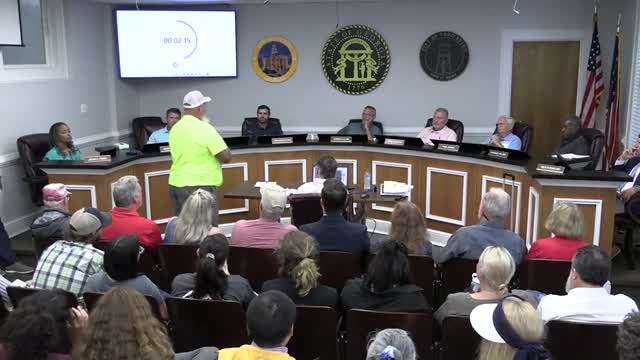Residents Rally Against Controversial Church Development Plan
July 10, 2024 | Upson County, Georgia

This article was created by AI summarizing key points discussed. AI makes mistakes, so for full details and context, please refer to the video of the full meeting. Please report any errors so we can fix them. Report an error »

During a recent government meeting, community members voiced strong opinions regarding a proposed development for the Hope of Generation Church in Thomaston, Georgia. The meeting highlighted concerns about the project's potential impact on local infrastructure, environmental issues, and community character.
Residents raised significant questions about sewage management and stormwater runoff associated with the proposed 72,000 square-foot facility. One resident emphasized the risk of developing drainage problems if the facility is built, urging officials to consider the existing agricultural and residential nature of the area. Another resident, Chad Cleave, expressed his desire for peace and quiet, citing his family's health issues and the importance of maintaining their rural lifestyle. He argued that the proposed location is unsuitable for such a large development, suggesting that alternative sites could be found.
Supporters of the church, including Benny Parish, countered these concerns by highlighting the ministry's positive impact on the community over the past 30 years. Parish, who has a background in corporate leadership, emphasized that the church aims to provide healing services and community support, asserting that the influx of visitors has been beneficial for local businesses.
The church's representatives, including civil engineer Chad Lambeth, presented plans that included a 100-foot undisturbed buffer around the property to address neighbor concerns about noise and environmental impact. Lambeth assured attendees that the development would comply with state and local regulations regarding stormwater management, aiming to improve existing drainage conditions rather than exacerbate them.
As the meeting concluded, officials acknowledged the diverse opinions expressed and indicated that further discussions would be necessary to address the community's concerns before making a final decision on the rezoning request. The outcome of this proposal remains uncertain as the community grapples with balancing development and preserving its rural character.
Residents raised significant questions about sewage management and stormwater runoff associated with the proposed 72,000 square-foot facility. One resident emphasized the risk of developing drainage problems if the facility is built, urging officials to consider the existing agricultural and residential nature of the area. Another resident, Chad Cleave, expressed his desire for peace and quiet, citing his family's health issues and the importance of maintaining their rural lifestyle. He argued that the proposed location is unsuitable for such a large development, suggesting that alternative sites could be found.
Supporters of the church, including Benny Parish, countered these concerns by highlighting the ministry's positive impact on the community over the past 30 years. Parish, who has a background in corporate leadership, emphasized that the church aims to provide healing services and community support, asserting that the influx of visitors has been beneficial for local businesses.
The church's representatives, including civil engineer Chad Lambeth, presented plans that included a 100-foot undisturbed buffer around the property to address neighbor concerns about noise and environmental impact. Lambeth assured attendees that the development would comply with state and local regulations regarding stormwater management, aiming to improve existing drainage conditions rather than exacerbate them.
As the meeting concluded, officials acknowledged the diverse opinions expressed and indicated that further discussions would be necessary to address the community's concerns before making a final decision on the rezoning request. The outcome of this proposal remains uncertain as the community grapples with balancing development and preserving its rural character.
View full meeting
This article is based on a recent meeting—watch the full video and explore the complete transcript for deeper insights into the discussion.
View full meeting
